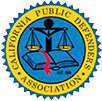Until now, it may be surprising to know that if a prosecutor deliberately and maliciously concealed or altered exculpatory evidence, (evidence that could result in an innocent person being convicted of a crime he or she did not commit!) such a prosecutor would only be facing a misdemeanor charge with a maximum of 365 days in county jail! In other words, as an example, in a murder case where an accused is facing life in prison with no possibility for parole, a prosecutor could manufacture false evidence or hide evidence that would help the defense, and only face a misdemeanor charge. This prosecutor would never be exposed to prison time or a felony record.
Finally, Governor Brown signed Assembly Bill 1909, which amends California Penal Code section 141, subsection (c), making it a FELONY for a prosecutor or District Attorney to “to intentionally and in bad faith alter, modify, or withhold any physical matter, digital image, video recording, or relevant exculpatory material or information, knowing that it is relevant and material to the outcome of the case, with the specific intent that [it]…will be concealed or destroyed, or fraudulently represented as the original evidence upon trial….” If convicted, a prosecutor can receive 16 months, two years, or three years in custody.
The author of the bill, Patty Lopez, an assemblywoman Democrat from San Francisco stated:
“Those individuals [prosecutors] who are willing to win a case at all costs, who abuse their power as officers of the court, must answer for their actions.” (OC Register, Oct 2016.)
While this new law has a lot of room for improvement, it is at least a start. Many critics suggest that no prosecutor will, in practicality, ever be charged with a felony under PC 141 because this crime is nearly impossible to prove! Not only must it be proven (beyond a reasonable doubt) that the prosecutor intentionally AND in bad faith altered or concealed evidence from the defense, but that evidence must be “material and relevant” to the defense’s case, AND the prosecutor must have known such evidence was “relevant and material to the outcome of the case”.
So while it is a step in the right direction, it will remain to be seen whether ANY prosecutor is ever charged under the newly amended Penal Code section 141, subsection (C), a statute specifically aimed at unethical prosecutors.









